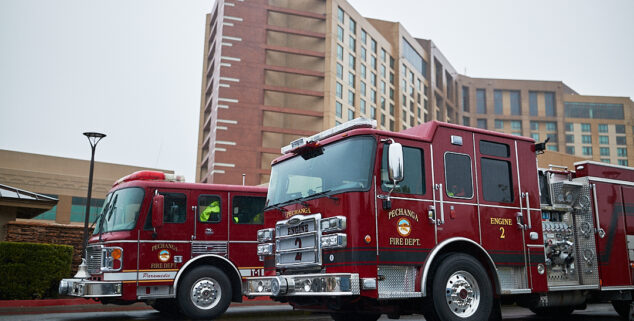News
Pechanga tribe boasts a fire department that serves the state
 Image via Pechanga Fire Department Facebook page
Image via Pechanga Fire Department Facebook pageWhen fires devastated Los Angeles last month, among those who dove into help were firefighters from the Pechanga Band of Indians.
The Southern California tribe, perhaps best known for its gaming resort in Temecula, has for 30 years invested in its own fire department, building a reputation for coming to the aid of major fires and other incidents throughout not only California, but also across the country.
Over the past few years, the Pechanga Fire Department has responded to fires all over California, from the Oregon to the Mexico borders, as well as the Maui fires in 2023 and flooding incidents in Puerto Rico and North Carolina. Its mutual aid work shatters stereotypes of decrepit reservation infrastructure and a lack of sophistication.
“I think it’s important that … we help other local communities in times of need,” said Jason Keeling, chief of the Pechanga Fire Department since 2009. “We try to always answer the bell when the call comes in.”
The Pechanga tribe is not large. Its membership has been said to be about 1,800, with perhaps half living on the SoCal reservation. But despite the tribe’s small size, its fire department boasts 30 suppression firefighters and about 10 additional support staff, as well as six firefighting vehicles – two traditional engines, two four-wheeled wildland fire trucks, a ladder truck and an urban search-and-rescue vehicle – based at two fire stations located on the East and West sides of their land.
On the reservation itself, the department most often responds to emergency medical services or EMS calls, which is understandable given the presence of the 1,100-room Pechanga Resort Casino. But tribal leadership prioritizes giving its firefighters experience through aiding in other incidents around the state and country, granting Pechanga a fire department with an extraordinary level of skill for its otherwise modest size, Keeling said.
“Our training and expertise are second to none,” he said, adding, “I feel like the team that we’ve built here, we’ve got a lot of talent. We’re up there with anybody of equal size.”
Mark Macarro, the Pechanga’s longtime chairman, said the tribe’s savvy fire department is “a point of pride” for members, but also “a consequence of necessity.”
Thirty years ago, around when Macarro first became chairman and when Pechanga opened its first gaming facility, a fast moving fire swept through the tribe’s 6,724-acre reservation, destroying eight homes on it and one just outside of it.
At the time, the closest fire station was about 20 to 25 minutes away.
Macarro said tribal members asked, “How can we prevent this from happening again? This was unacceptable.”
The tribe responded by investing some of its early casino revenue into building its fire department, which today represents the third largest expenditure of Pechanga’s tribal budget and touts a response time of less than five minutes to any structure on its Riverside reservation thanks to its full-time, 24-7 operation.
“We try to maintain an aggressive posture to fire response,” Macarro said, noting the environmental and nearby jurisdictional factors that he said have made it critical for the Pechanga tribe to look out for itself.
Indeed, Pechanga also employs an 11-person crew dedicated to clearing out the brush on the reservation land, to eliminate the potential fuel for wildfires in the arid climate.
“We’re trying to be self-sufficient,” said Keeling, the fire chief. “The tribe has invested heavily in public safety,” he said.
Fire, coincidentally, also holds a special significance to the tribe.
In the past, the tribe relied upon fire for warmth during the rainy season and used it as a tool for hunting, particularly rabbits. Fire also plays a critical role in the tribe’s religious customs; fires are always present at their funeral ceremonies.
In fact, in the Pechanga’s native tongue, Chamtéela, there are more than ten words for fire, illustrating its importance within their ancestral culture.
Today, you might say Pechanga’s focus on, and investments in, fire safety represents a sort of modern-day extension or evolution of the tribe’s ancestral traditions around fire.
“I have a lot of pride to continue that tradition,” Keeling said, mentioning the responsibility he feels in maintaining the department’s readiness and skill. “It’s an honor.”
Want to see more stories like this? Sign up for The Roundup, the free daily newsletter about California politics from the editors of Capitol Weekly. Stay up to date on the news you need to know.
Sign up below, then look for a confirmation email in your inbox.

Leave a Reply